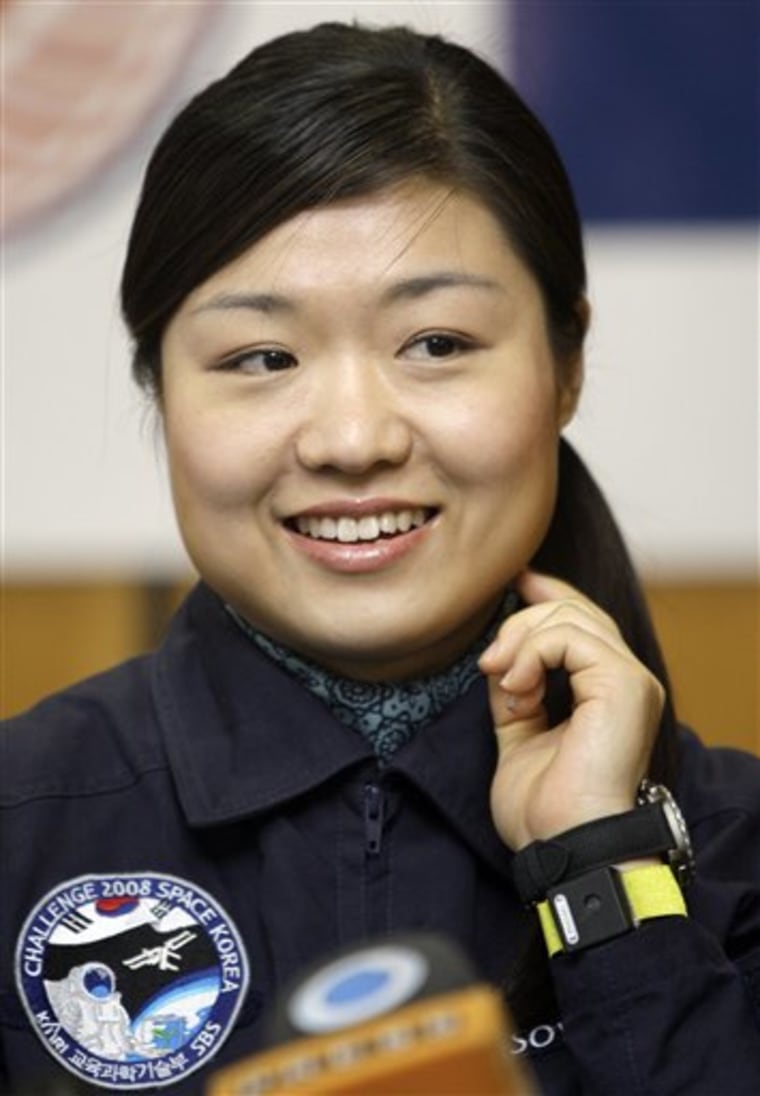Who was more scared — South Korea's rookie astronaut who watched fire engulf the capsule she was in as it plummeted to Earth, or the locals in a barren Kazakh steppe who came across people who had plunged from the sky?
Both those tales emerged Monday at a news conference of participants in the latest Russian space mission.
"During descent I saw some kind of fire outside as we were going through the atmosphere," said Yi So-yeon, the first South Korean to have completed a spaceflight. "At first I was really scared because it looked really, really hot and I thought we could burn."
Yi returned to Earth with U.S. astronaut Peggy Whitson and Russian flight engineer Yuri Malenchenko aboard a Russian Soyuz capsule on Saturday.
The three endured a bumpy ride and gravitational forces up to 10 times stronger than Earth's because the capsule took a steeper-than-usual trajectory, the result of a technical problem that is under investigation.
The TMA-11 craft landed about 260 miles from its target.
Yi said that despite the fire she saw outside, she realized that it was not even warm inside the capsule. "I looked at the others and I pretended to be OK," said Yi, a 29-year-old bioengineer.
Veteran cosmonaut Malenchenko, who has now spent 515 days in space, said that by the time the crew had alighted from the toppled capsule, about a dozen curious locals had arrived at the scene.
"They were very surprised and could not believe their eyes," Malenchenko said. "One of them asked if the landing capsule was a boat. Another said that we might have jumped down from a plane," Malenchenko said.
When he told them they were astronauts, "They nodded but then asked again where we had come from. They could not believe that we had been to space. They believed us only when they saw the spacesuits."
The locals helped the crew retrieve their phone to call for help, he said. "It was difficult to retrieve those things as the capsule had turned upside down," Malenchenko said.
All three members of the crew walked slowly and were unsteady when arriving for the news conference at Russia's Star City cosmonaut training center outside Moscow. Medics who flanked them ensured they didn't fall.
Officials have yet to explain why the capsule went out of control and fell to Earth in a so-called "ballistic re-entry."
Malenchenko said the craft somehow switched automatically to ballistic re-entry.
"There was no action of the crew that led to this," he said. "Time will tell what went wrong."
It was the second time in a row — and the third since 2003 — that a Soyuz landing had gone awry.
Despite the problems, Whitson, who became America's most experienced astronaut, with 377 cumulative days in space, said she still had faith in the Soyuz.
"The Soyuz has been seen by history to be a very reliable craft," she said.
Slideshow 12 photos
Month in Space: January 2014
Yi, who said she made good on a promise to her fellow travelers by singing "Fly Me to the Moon" in space, set off for the international space station on April 10.
With her were cosmonauts Sergei Volkov and Oleg Kononenko, who replaced Whitson and Malenchenko. South Korea paid Russia $20 million for Yi's flight.
She cut a modest figure Monday. "I cannot believe I became some kind of hero," Yi said. "I'm just a common Korean woman," she added.
Whitson and Malenchenko spent roughly six months performing experiments and maintaining the orbiting station and were replaced by Volkov and Kononenko. They joined American astronaut Garrett Reisman, who arrived last month on the U.S. space shuttle Endeavour.
Volkov and Kononenko will be replaced in the fall.
As for her record, overtaking Mike Foale's haul of 374 space days, Whitson said she felt "lucky to have been in the right place in the right time."

